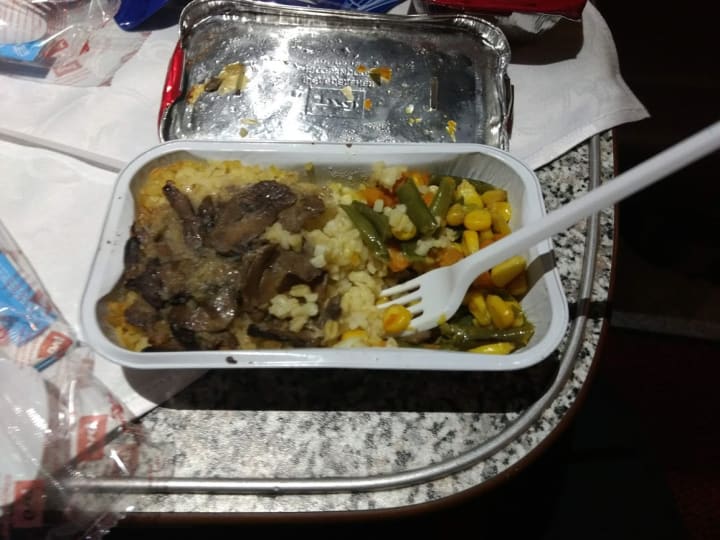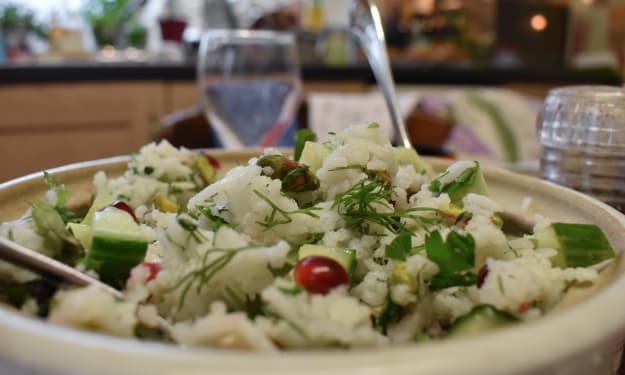Some surprising vegetarian delights of Russia
It's not just meat and potatoes.

Before moving to Russia, my expectations of their vegetarian dishes were low. I boarded the plane fully prepared to eat nothing but potatoes and black bread for four months. But I’ve been surprised, and met many unexpected approaches to vegetarianism. All of them had dill on top of them.
The first meal I had in Russia was on the train, en-route to Kazan. The impeccable train attendant reeled off the menu in high-speed Russian. When we nervously inquired about vegetarian options, she was quick to reassure us. We could have the chicken and rice, without the chicken. I remember feeling relieved that I would be able to find rice in Russia.
Fortunately, the attendant came back, offering pearl barley with vegetables and mushrooms. It was presented in a metal dish and looked like someone had sat on it. The contents were various shades of brown and I remained sceptical. But despite its appearance it was, in fact, delicious. Thus began a month of pleasant surprises.

Before last year, I was shamefully ignorant about the Russian diet. All I knew was the stereotype of meat and potatoes, washed down with vodka. But having spent four months sampling as much of the food there as my diet (and stomach) allowed, I know better. I’m converted.
Perhaps it was inevitable. Just like most Russians, nothing gets me out of bed in the morning like a bowl of porridge. But there’s not just the same beloved bowl of oatmeal that we all eat in the UK - there’s also the Russian favourite; buckwheat. Despite considering myself to be a reasonably experienced cook, before living in Russia I couldn’t have picked out buckwheat in a line up of grains. I couldn’t have told you how to cook, serve or eat it either. Isn’t buckwheat something birds eat? Now you’ll find me devouring bowls of the stuff every day. It’s strangely nutty and savoury, nothing like a sweet and creamy bowl Ready Brek. But it does have the same comforting and warming quality that makes it so satisfying in the morning.
I’ve also fallen head-over-heels with the Russian “stolovaya”. A stolovaya is essentially the school canteen you wish you’d had in primary school. There’s soup, salad, various breads and pastries, and all for less than sixty roubles (or a pound). For less than two hundred, you could add a mountain of hot potatoes, buckwheat, vegetables or cabbage. As a nervous Russian speaker, the stolovaya is the perfect lunchtime destination. To get a meal, I scarcely have to utter a few words. I could just point, if I were really struggling to articulate. For minimum money and effort, you’re given a surprisingly delicious meal that tastes homemade and gives you a comprehensive sample of the average Russian diet. There’s nothing like it in the UK.
Another reason to love Russian cuisine is for its abundance of fresh and homemade products. It means that plant-based dishes are often locally grown and made by the fair hands of your Russian friends and hosts. Next to my first bowl of oatmeal, my host offered a jar of vibrantly orange jam. It wasn’t marmalade, as I first assumed, but rather a sweet apricot jam from their grandmother’s garden. I later discovered rows of them in their cupboards waiting to be eaten.

The reason it’s far more common to make and grow your own food here is the phenomenon of the ‘dacha’. A dacha is a small house in the country with a big garden for growing fruit and vegetables. After two weeks in Kazan, my host family’s babushka arrived from the country, somehow carrying with her two crates of apples, bags of tomatoes, miniature aubergines, and three panels of honeycomb. She carefully dried half of the apples under the sun and baked them into cakes. The tomatoes and aubergines were gently sautéed with salt and herbs to make a fantastically moreish warm salad. And the honey was carefully decanted into ginormous vats around the kitchen, to be slowly eaten by the spoonful or stirred into tea.
Dodging potentially meaty meals is still not straightforward. Fish and chicken are often not considered to be meat and will regularly be offered as a ‘vegetarian’ alternative. Irritatingly, soups which would otherwise be vegetarian are garnished with chunks of beef. But for all that, the stigma which surrounds vegetarianism in the UK seems absent here. I’m yet to be told that my diet is unhealthy, questioned about my motives, or even given a judgemental look. There are plenty of practical obstacles to a vegetarian lifestyle wherever you go, but there are plenty of pleasant surprises to be had as well.
About the Creator
Alissa Mann
Linguist, explorer, food lover
Photographer-in-training
Enjoyed the story? Support the Creator.
Subscribe for free to receive all their stories in your feed. You could also pledge your support or give them a one-off tip, letting them know you appreciate their work.






Comments
There are no comments for this story
Be the first to respond and start the conversation.